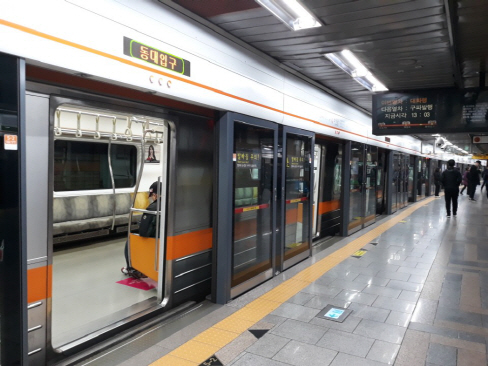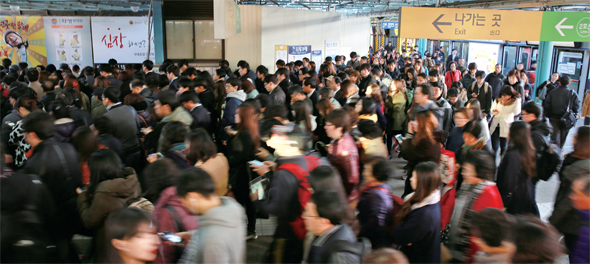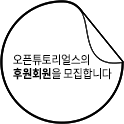Hello. I am taehee gim, a Korean. Today I will tell you about korean's 대중교통. 안녕하세요. 저는 김태희, 한국 사람이에요. 오늘은 여러분에게 한국의 대중교통에 대해 알려드릴게요.
- 여러분 = you (plural, formal, honorific, written style)
- 알리다, 알려요 = tell, inform, introduce
- 알려드리다, 알려드려요 = more honorific
- ~할 게요 = I (promise that I) will. You can learn more in detail about korean future tense.
Today I tried colloquial. rather than a direct translation, I did it in natural Korean. It will be difficult for beginners of Korean. 오늘은 구어체로 써봤어요. 직역보다는 자연스러운 한국말로 의역했어요. 한국어 초보자에게는 어려울 거에요.
- 구어체 = colloquial, spoken style. Usually ~해요 style.
- 문어체 = written, literary style. Usually ~합니다(하십시오)style.
- 해 보다, 해 봐요 = try to
- 직역 = direct translation. Following the grammatical structure of the original text.
- 자연스러운 = natural
- 의역 = liberal translation. Following the meaning of the original text.
In some Asian countries, You can see many cars, motorcycles and bicycles on their roads. The roads are usually congested. 아시아 몇몇 나라에 가보면, 도로에서 차나 오토바이, 자전거를 많이 볼 수 있어요. 길은 보통 혼잡하죠.
- 차/자동차 = car
- 오토바이 = motorcycles
- 자전거 = bicycles
- 도로, 차도 = road (for cars, motorcycles, etc)
- 인도 = sidewalk, pavement
- 길 = road, street, path, way, route
- 혼잡 = congestion. 혼잡하다/해요 = be congested

But in Seoul서울 - the capital of south korea-, Koreans often use public transportation. It's convenient and cheap. 하지만 서울 -한국의 수도- 에서는, 한국 사람들은 자주 대중교통을 이용해요. 편리하고 저렴하죠.
- 수도 = capital
- 편리 = Convenience. 편리하다/해요 = be convenient
- 저렴 = cheapness. 저렴하다/해요 = 싸다, 싸요 = be cheap
- ~하죠 = ~하지요 = (right? isn't it?), It is used to describe a fact, ask, request in positive way.

So when we watch Korean dramas or movies, we often see people riding the subway or bus. It is similar to japan. But in Korea, it is hard to see a double-decker bus or a streetcar. 그래서 한국 드라마나 영화를 보면, 지하철이나 버스를 타고 있는 모습을 자주 보게 돼요. 일본과 비슷하죠. 하지만 한국에서는 2층버스나 전차는 보기 힘들어요.
- ~하면 = if, when
- 지하철 = subway, Underground
- 버스 = bus
- 보다 = watch, see
- 타다, 타요 = ride, get on, board
- ~하게 돼요 = ~하게 되어요 = become, (because of some reason, usually not one's will or choice)
- 2층버스 = double decker (bus)
- (노면)전차 = streetcar, tram
- ~하기 힘들어요 = it is hard to~

when you travel to Seoul, You will also use it a lot. Please read the subway or bus route map carefully. It is because... If you don't, You might get lost! Or you can use the directions app. 여러분도 서울에 여행오시면 많이 쓰게 되요. 지하철이나 버스 노선도를 잘 읽어주세요. 길을 잃을지도 모르니까요! 아니면 길찾기 앱을 쓰시면 편해요.
- 여행 = trip, travel. 여행오다, 여행와요 = come in a journey, travel to Korea.
- You can use present tense, as future tense.
- ~지도 몰라요. = might, can
- ~하니까요 = Because ~
- A. 아니면 B = A. either B
- 길찾기 = Finding a way
- 앱 = (smartphone) app, application
- ~하면 편해요. = it is convenient to~, you can~
During rush hour, it's dense and very crowded. Of course. Koreans sometimes also call rush hour(Russian War). 출퇴근 시간대에는 빽빽하고, 엄청 붐벼요. 당연하죠. 한국에서도 러시아워라고 부르기도 해요.
- 출퇴근 시간대 = rush hour 출근 = getting to work, 퇴근 = leaving work
- 빽빽한 = dense, packed
- 엄청 = a lot (in amount or degree)
- 붐비다, 붐벼요 = crowded, packed
- 당연하다, 당연하죠 = of course
- 부르다, 불러요 = call (something, not making a phone call)
- ~하기도 하다/해요 = sometimes ~ also ~
According to studies, even inconvenient commute results in a drop in the happiness index. They even get less involved in politics. 연구에 따르면, 불편한 출퇴근 때문에 행복지수가 떨어진다고 해요. 심지어 정치에도 덜 참여하게 됀다고 해요.
- 연구에 따르면 = according to a study(the study, studies)
- 불편 = inconvenient
- 행복 = happiness
- 지수 = index
- A때문에 B해요 = A results in B = B because A
- 떨어지다, 떨어져요 = fall, drop, go down
- 심지어 = even
- 덜 = less
- 정치에 참여하다/해요 = participate/involved in politics
- ~한다고 하다, ~해요 = verb ending to express Quoting.
So some people argue that public transportation should be increased or that flexible work should be expanded. 그래서 어떤 사람들은 대중교통을 늘리거나, 유연근무제를 확대해야한다고도 주장해요.
- 늘리다/늘려요 = increase, expand, extend, improve
- 유연 근무제 flexible work
- 확대 expansion
- ~해야 한다/해요 should, have to, need to
- 주장 argument, insist, opinion, claim




